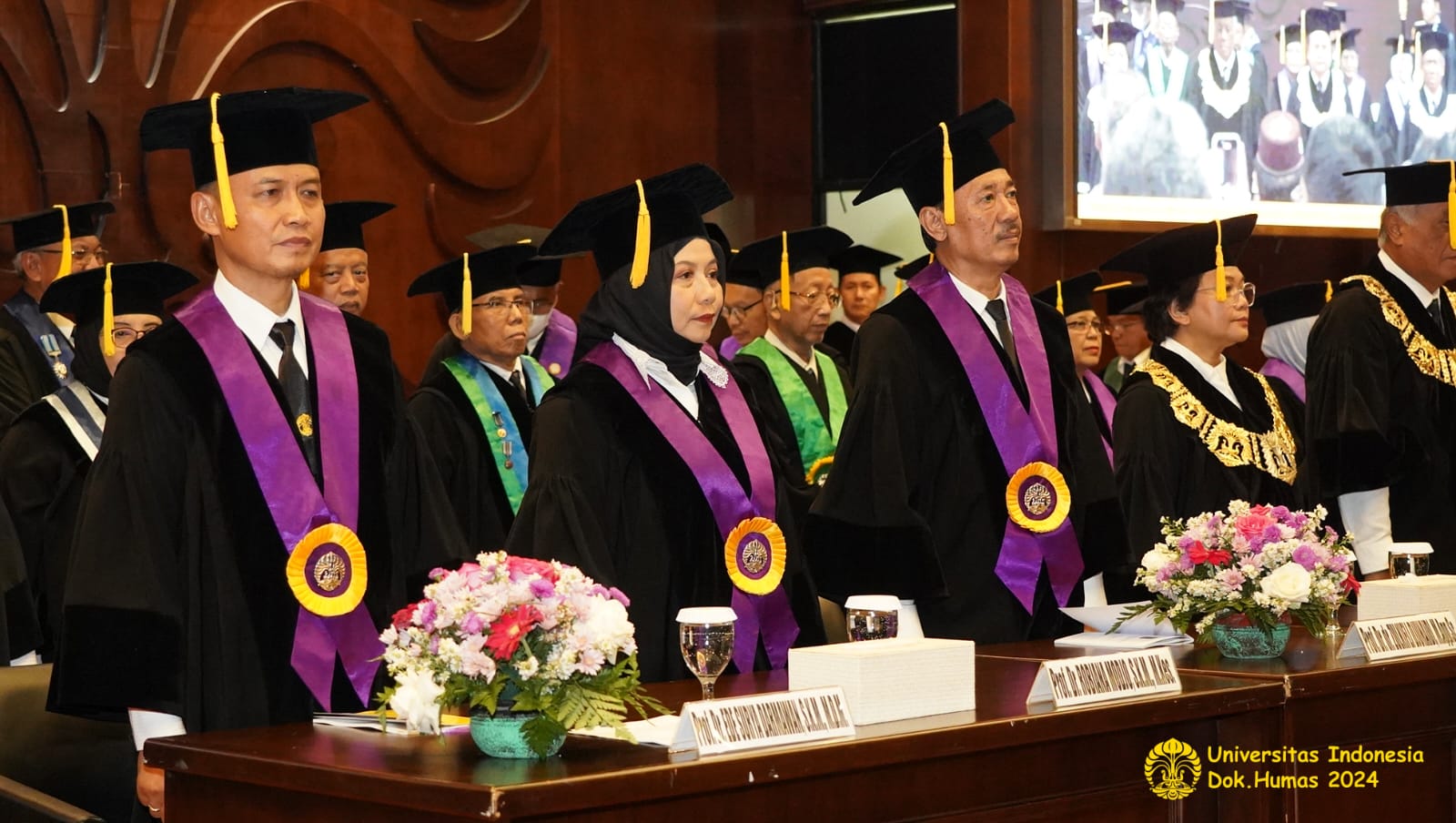On Saturday, November 20, 2024, the Universitas Indonesia (UI), led by Rector Prof. Ari Kuncoro, S.E., M.A., Ph.D., inaugurated three professors from the Faculty of Public Health (FPH). The three professors were inaugurated at the UI Session Hall as Prof. Dr. dr. Zulkifli Djunaidi, M.App.Sc., as a professor in the field of Occupational Health and Safety (OHS) Risk Management, Prof. Dr. Robiana Modjo, S.K.M., M.Kes., as a professor in the field of Occupational Health, and Prof. Dr. Ede Surya Darmawan, S.K.M., M.D.M., as a professor in the field of Health Development Administration.
In his inaugural speech titled “OHS Risk Management to Anticipate Future Risks Due to Technological Development and Generation Gaps,” Prof. Dr. Zulkifli Djunaidi discussed the importance of OHS risk management to prevent work-related accidents and diseases. He emphasized the need for a proactive approach in hazard identification, risk assessment, control, and continuous monitoring to manage risks in the workplace.
Prof. Zulkifli also highlighted that technological advancements and changes in the world of work present new challenges in OHS management. In the era of Industry 4.0, which combines the physical, digital, and biological worlds, challenges arise from the need to align OHS regulations with new technologies such as AI and Big Data. He suggested that technology should be developed in alignment with OHS programs, prioritizing worker safety, and emphasized the importance of collaboration between researchers, practitioners, and industries to ensure a safe transition in workplaces.
In the conclusion of his speech, Prof. Zulkifli stressed the importance of OHS management training to raise worker awareness of workplace hazards. He also noted that OHS risk management is a critical strategy to face future risks driven by technological advancements, social changes, and global economic shifts. Additionally, Prof. Zulkifli encouraged collaboration between the government, employers, and workers to create a safe and healthy future workforce. He has an extensive track record in OHS and is actively involved in various research, including in the construction and oil and gas sectors.
Meanwhile, Prof. Dr. Robiana Modjo, S.K.M., M.Kes., delivered a speech titled “Occupational Health as a Main Pillar in Promoting Decent Work for Indonesia’s Vision 2045.” Prof. Robiana conveyed that more than 2.7 million workers die each year due to work-related accidents and diseases, indicating the need for more effective OHS management to protect workers and enhance productivity and organizational reputation.
Prof. Robiana also linked the importance of occupational health to the Sustainable Development Goals (SDGs), including poverty eradication, improving workforce health, and supporting decent work and economic growth. She emphasized that Indonesia, with the demographic bonus starting in 2024, could leverage occupational health to achieve its Vision 2045, which aims to create a healthy, productive workforce ready to compete in the global market. She advocated for collaboration between the government, private sector, and workers to ensure a healthy and resilient workforce.
As part of her recommendations, Prof. Robiana proposed improving the quality of occupational health programs through surveillance and evaluation, adjusting policies to better meet current needs, and utilizing digital technology to increase program efficiency. She also stressed the importance of stricter oversight on occupational health and safety across all sectors. “With the right policies and strong collaboration, Indonesia can capitalize on the demographic bonus to improve occupational health and achieve better national goals,” Prof. Robiana said.
Furthermore, Prof. Dr. Ede Surya Darmawan, S.K.M., M.D.M., delivered his inaugural speech titled “Challenges in Health Development in Facing the Demographic Bonus and Indonesia 2045.” Prof. Ede highlighted Indonesia’s achievements in the health sector, such as improvements in life expectancy and reductions in infant mortality. However, he also reminded that Indonesia still faces significant gaps compared to developed countries, particularly in life expectancy and infant mortality rates.
Prof. Ede explained that Indonesia is entering a demographic bonus period, which offers significant opportunities for economic growth but also brings challenges in health and governance. “The two main challenges are epidemiological transitions, unhealthy lifestyles, healthcare access disparities, and issues in health system planning and oversight,” said Prof. Ede. Therefore, he recommended the transformation of the health system with a data-driven and evidence-based approach and better integration between the government, private sector, and society.
As part of his recommendations, Prof. Ede emphasized the importance of repositioning health development as the foundation for building a healthy and productive population, and the transformation of the health system involving all layers of society. He also proposed a new definition of public health, not just focusing on individual services but as a collective responsibility to improve the quality of life for citizens throughout their life cycle. “With the right approach, Indonesia can leverage the demographic bonus to achieve Indonesia 2045, with a healthy, productive, and highly competitive society,” concluded Prof. Ede.
These three professors from FPH UI became the 36th, 37th, and 38th professors to be inaugurated by the Universitas Indonesia in 2024. (wrk)

